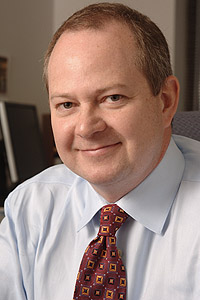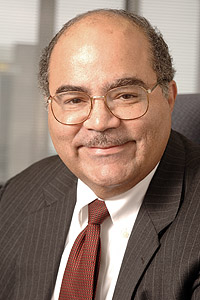UChicagoTech creates a name for itself in technology transfer, as it continues to benefit research, faculty, society
Steve KoppesNews Office
The University of Chicago’s technology transfer operation is beginning its sixth year of steady growth.
Since the Office of Technology & Intellectual Property’s inception in 2001, invention disclosure rates have doubled, to 142 in fiscal year 2006; royalties have more than tripled, to more than $8 million in FY 2006; and the office is now returning more than $5 million a year to inventors, laboratories, departments and divisions.
As of today, the office will be known as UChicagoTech for short. Formerly known as UCTech, the office seeks to reinforce its University of Chicago identity as its activities become more tightly interwoven with those of the faculty,
Raphael Lee, Professor in Surgery and Chair of UChicagoTech’s Faculty Advisory Committee, and Alan Thomas, Director of UChicagoTech, discuss the policies and philosophy that underlie UChicagoTech’s efforts to harness the University’s intellectual capital for societal benefit.
The next issue of the Chronicle, to be published Thursday, Dec. 7, will include a story about some of UChicagoTech’s successes in technology transfer, which have benefited thousands of people.
What is the difference between UChicagoTech and its predecessor, ARCH Development Corporation?
 Alan Thomas  Raphael Lee | |
Thomas: “ARCH really had an explicit mission about start-ups. We have a much more service-oriented flavor, which certainly doesn’t discount start-ups. We’re happy to help with those for faculty who are interested in doing that. But we’re not all about start-ups any more.
“One of the key structural features of UChicagoTech that differentiates it from ARCH is the UChicagoTech Faculty Advisory Committee, with whom I meet monthly. That provides direct accountability to the faculty. It also provides a forum for faculty who have issues with or suggestions for UChicagoTech to actually get involved. It’s a forum for a committee of peers to have really good discussions about these things.”
How big is the staff at UChicagoTech, and how is it organized?
Thomas: “There are 15 people on the staff, which is about half technology-licensing professionals and about half support staff.
“Most of what we get here is biology, so most of our licensing professionals have at least master’s degrees, if not Ph.D.s, in biochemistry and molecular biology. People here tend to be DDEs, that is, doctors of dangerous eclecticism. We’re a mile wide and an inch deep on most things. It’s part of the skill set that when you find something interesting you have to be able to drill down very quickly and gain expertise in the area, such that you can talk to the leading-edge researchers in the field.”
What is UChicagoTech’s revenue-sharing policy?
Thomas: “Twenty-five percent of our gross revenues go back to the inventors as individuals. Another 10 percent of our gross goes back to the inventors’ labs and research efforts. Another 5 percent of our gross goes back to their departments. And another 5 percent goes back to the deans of their divisions. So every dollar that comes in, we automatically give 45 cents of it straight back to the University and the inventors. Then we have to run our operation on what we get to keep. So, even if we’re only making a little money or losing a little, that’s because we’re redirecting a lot of it back into the research enterprise.”
What are the pros and cons of universities becoming involved in technology transfer?
Lee: “It’s the taxpayer who in most cases is supporting the university laboratories. I think we would all agree that the best return they can get for their investment is the benefit from the technology that was developed in terms of job creation and useful new products, whether it be a new drug or what have you. I think it’s clear that it is in the common good for universities to develop structures like UChicagoTech that facilitate the transfer of technology from the research laboratory to the private sector.
“The concern expressed by some critics is that as the commercialization process becomes a part of the culture of a university, the more the faculty might start to shift its focus from basic research to research that has commercial value. Several published surveys of American universities have found no evidence to support this concern. In 2005, Shanghai Jiao Tong University ranked the top 500 universities in the world based on certain science-oriented parameters. The University of Chicago ranked 8th overall and sixth in the United States, indicating that it is one of the major contributors to modern technology development. A lot of that knowledge comes from discoveries such as Chandrasekhar’s prediction of black holes and shaping of special relativity. Today there’s no commercial value to his discoveries, and yet his work is one of the most important contributions from the University of Chicago. So, a big part of the legacy of this University as a contributor to knowledge doesn’t have obvious commercial potential. This aspect of university research must continue to be prioritized.
“The UChicagoTech Faculty Advisory Committee allows for faculty input into the business aspect of tech transfer to bring the appreciation of both valuing the open intellectual environment and the importance of transferring technology to the public in a way that benefits all.”
How do you see the future of technology transfer at the University of Chicago?
Lee: “UChicagoTech has a fundamental role, really, in realizing the value of the University’s research. A successful outcome of research is to create technology that has a broad impact on society, and that inexorably involves technology transfer. UChicagoTech is well-positioned to do this. The UChicagoTech staff have been effective in getting this type of work done. And finally, I think that the leadership of this University really has a full appreciation for the evolving role of universities in America as not only centers for education and discovery but also as centers for economic development in the community.”
Go to UChicagoTech.
![[Chronicle]](/images/sidebar_header_oct06.gif)